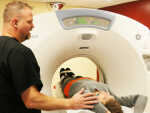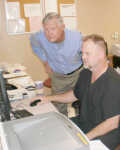Grateful son donates software to Oberlin hospital for better scanning

OBERLIN, Kan. -- A routine scan of a new patient led the patient's grateful son to donate $24,500 worth of software that will allow Decatur Health Systems to perform quicker, more sensitive bone density screenings, allowing for earlier detection and treatment of osteoporosis.
Audie Chason accompanied his mother, Josefa, to her first visit with DHS medical director Dr. Robert Rosin.
The Austin resident was impressed by Dr. Rosin's approach to his mother's health care and the responsiveness of the staff. He was particularly taken with the facility's up-to-date equipment and the bedside manner of radiologic technologist Dean Sprinkle, who performed a routine CT scan on Chason's mother that day.

A former radiologic technologist himself, Chason recently retired from an executive position at Mindways CT, a Texas-based company that researches and develops software for CT scanners. The company's QCT Bone Density software works with a Computed Tomography scanner to provide a way to detect low bone mass in the spine earlier. Chason's company's software works by measuring the interior bone, which is affected earlier and to a greater degree, separately from the denser walls of the bone. The price of the software is generally prohibitive for smaller, rural facilities to afford.
Mr. Chason decided that his company's software would make an excellent gift for the rural Kansas hospital and the community it serves and would be an excellent way to thank Decatur Health Systems, Dr. Rosin and Sprinkle for the care they had given his mother.
According to Sprinkle, "Quantitative Computed Tomography (QCT) is a great benefit for our patients and service area. Our QCT is faster and has no uncomfortable positioning requirements like the mobile DXA scan unit previously used at the hospital. The QCT measurements are more accurate than DXA by virtue of QCT's ability to avoid artificially high BMD measurements due to factors such as obesity, arthritis or degenerative spine diseases."
Dr. Rosin recommends bone mineral density screening for postmenopausal women every 24 months, and yearly if a patient is currently being treated for osteoporosis. "Early detection will allow us to begin earlier treatment to conserve bone quality and reduce susceptibility to fractures of the hips, spine and wrists. These types of fractures are a huge factor in reducing quality of life in patients, particularly in older adults. They also contribute significantly to the cost of health care in this population." Rosin added, "Having the ability to do these scans on-site and at the patients' convenience is a big advantage in screening for these problems."
In the past, DHS has used a mobile DXA scan unit that visited Oberlin monthly. Using this gift, patients will be able to get their bone density screenings done during regular appointments. The scans are quick, taking an average of 5-10 minutes, and use a low dose of radiation, comparable to that of a mammogram.
"Donations such as Mr. Chason's are a big factor in allowing rural hospitals like ours the opportunity to stay up-to-date and competitive in the health care market that exists today", according to DHS's CEO Johnathan Owens. "We are always looking for donations of equipment or cash that keep the health care dollars of our patients flowing within the local economy."
A physician referral is required for a bone mineral density screening and can be obtained by scheduling an appointment through the DHS Family Practice Clinic at (785) 475-2015.
